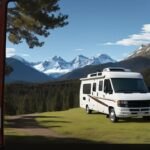Buying an RV is a big decision. It’s a major investment, and you want to make sure you choose the right one for your needs and budget. But with so many different types of RVs on the market, it can be difficult to know where to start.
That’s where this guide comes in. We’ll cover everything you need to know about choosing an RV, from the different types available to the things to look for when inspecting a potential purchase. We’ll also share some tips from experienced RVers on what to expect and how to make the most of your new RV.
Types of RVs
There are many different types of RVs available, each with its own advantages and disadvantages. Here is a brief overview of the most common types:
- Class A motorhomes: Class A motorhomes are the largest and most luxurious type of RV. They typically have all the amenities of a home, including kitchens, bathrooms, and bedrooms. However, they are also the most expensive type of RV and can be difficult to drive and park.
- Class B motorhomes: Class B motorhomes are smaller and less expensive than Class A motorhomes. They are often built on van chassis and have fewer amenities, but they are also easier to drive and park.
- Class C motorhomes: Class C motorhomes are a cross between Class A and Class B motorhomes. They have more amenities than Class B motorhomes, but they are not as large or expensive as Class A motorhomes.
- Travel trailers: Travel trailers are towed behind a vehicle. They are typically less expensive than motorhomes, but they also have fewer amenities.
- Fifth-wheel trailers: Fifth-wheel trailers are towed behind a pickup truck. They are typically larger and more luxurious than travel trailers, but they also require a special hitch.
Choosing the Right RV for You
When choosing an RV, there are a few things you need to consider:
- Size: How much space do you need? If you are traveling with a large family or group, you will need a larger RV. However, if you are traveling solo or with a partner, you may be able to get away with a smaller RV.
- Amenities: What amenities are important to you? Do you need a kitchen, bathroom, and bedroom? Or are you willing to sacrifice some amenities in order to save money or make the RV easier to drive and park?
- Budget: How much money can you afford to spend? RVs can range in price from a few thousand dollars to hundreds of thousands of dollars. It is important to set a budget before you start shopping so that you don’t overspend.
Inspecting a Potential Purchase
Once you have found an RV that you are interested in, it is important to inspect it thoroughly before you buy it. Here are a few things to look for:
- Roof: Check the roof for any leaks or damage.
- Tires: Inspect the tires for any signs of wear or tear.
- Appliances: Turn on all of the appliances to make sure they are working properly.
- Systems: Check all of the systems, such as the plumbing and electrical system, to make sure they are working properly.
Tips from Experienced RVers
Here are a few tips from experienced RVers:
- Start small: If you are new to RVing, it is a good idea to start with a smaller RV. This will give you a chance to learn the ropes before you invest in a larger RV.
- Do your research: Read reviews and compare different models before you buy an RV.
- Inspect the RV carefully: Before you buy an RV, have it inspected by a qualified mechanic. This will help you identify any potential problems.
- Be prepared for anything: RVing can be unpredictable, so it is important to be prepared for anything. Make sure you have a backup plan in case something goes wrong.
FAQ
What is the best type of RV for me?
The best type of RV for you will depend on your individual needs and budget. If you are traveling with a large family or group, you will need a larger RV. However, if you are traveling solo or with a partner, you may be able to get away with a smaller RV. It is also important to consider what amenities are important to you and how much money you can afford to spend.
What should I look for when inspecting a potential purchase?
When inspecting a potential purchase, it is important to check the roof for any leaks or damage, the tires for any signs of wear or tear, the appliances to make sure they are working properly, and all of the systems, such as the plumbing and electrical system, to make sure they are working properly.
Embarking on road adventures with an RV in tow can fuel endless excitement, envisioning the boundless landscapes and family memories crafted along the way. My own journey into the RV realm, impulsively diving into camper-buying alongside Jane, was a rollercoaster. We lucked out, snagging a deal on a lightly used, practically perfect camper, but not everyone’s so fortunate. From RVers landing a size too small, to others drowning in extravagant interiors, the path is often tricked with misconceptions and impulse choices.
Essential Takeaways for Your RV Hunt
- Understand Your Towing Limits: Your vehicle’s towing capacity isn’t a figure to be met but to be respected with a buffer. If your truck pulls 10,000 pounds, eye a trailer whose loaded weight stands around 7,500 pounds.
- Grasp Weight Specifications: Trailer dry weight excludes all your camping necessities. Factor in all additional weight, like your supplies, food, and essentials, to avoid overloading.
- Estimate Accurate Payloads: The total load you pull includes hitch weight, passenger weight, and everything packed in your truck. Consider an anti-sway weight distribution system for steering safety, not just airbags.
Before You Seal the Deal
- Budget Sensibly: Brace yourself for not just the RV’s price tag but also the lurking costs of upgrades, repairs, and customizations, not forgetting the quick depreciation of RVs.
- Expect Extra Costs: Tag, title, and possibly destination and administrative fees can quietly pad your final bill. Factor in equipment like anti-sway kits and brake controllers, too.
- Navigate Trade-in Challenges: After a few journeys, your dream RV might shift shapes, bringing potential trade-in dilemmas. Ponder on your actual camping style and future needs to avoid financial pitfalls in the trading process.
- Gear-Up Your Budget: Apart from the RV, you’ll need to plunge into accessory investments like hoses, filters, surge protectors, regulators, and a bounty of other camping essentials.
RV Shopping Tips Unveiled
- Form a Preliminary Vision: Scour through various models online to carve out a semblance of what you seek before you physically explore dealerships. Be considerate of the salesperson’s time and energy by arriving informed and intentional.
- Consider Material and Feature Preferences: From wood frames to aluminum, traditional metal-sided exteriors to smooth-sided ones, and various electrical specifications – know your penchant.
- Bathroom Checks: Ensure the bathroom layout, especially the toilet space, adheres to your comfort and spatial needs.
- Be Mindful and Realistic: You might not spot your dream RV in the first lot. Concessions will be made, and adaptability in your expectations might just unearth a hidden gem in the RV world.
- Keep a Comprehensive Record: As you navigate through models, jot down likes, dislikes, and specific features of each to assist your final decision-making.
Although the RV shopping ride is speckled with its fair share of complexities and considerations, the thrill of envisioning on-road adventures in your new home-on-wheels is unparalleled. Embark on your RV hunting journey armed with preparation, clarity, and a dash of flexible expectations to find a rolling abode that promises adventures galore! Got questions or in need of some RV wisdom before you head out shopping? Drop a comment below!
- A Chat with Nate and Mika, Christian Wedding Photographers - July 18, 2024
- Ultimate Guide To Playing Online Casinos - May 27, 2024
- Addiction Recovery Books Worth Reading - January 24, 2024









